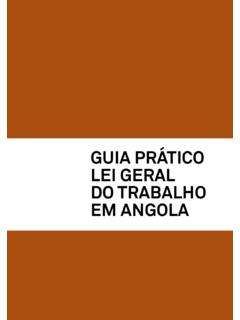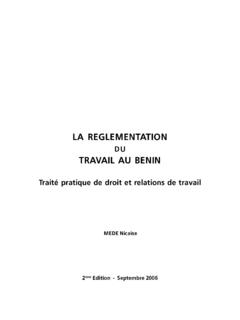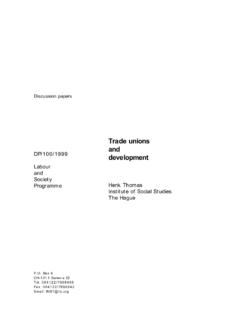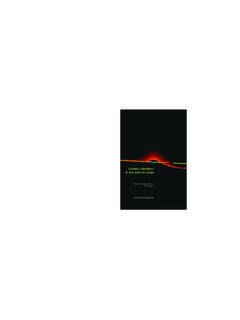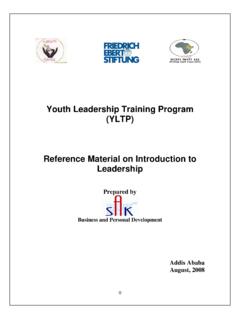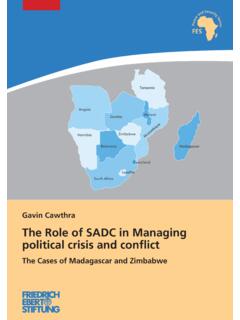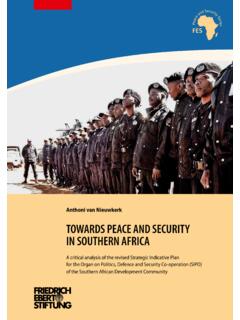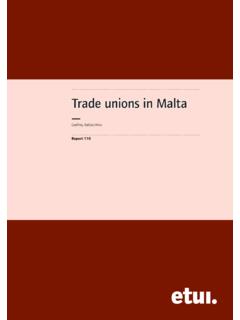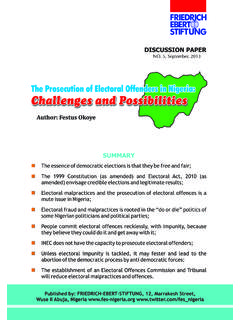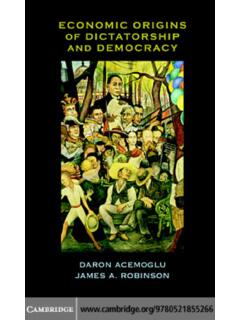Transcription of Dictatorship, Democracy and Economic Regime
1 dictatorship , Democracy and Economic Regime Reflections on the Experience of South Korea Werner Kamppeter, January 2008, FES Korea Rhetoric of Reaction This calligraphy hangs in a jazz club in Sam-cheongdong, a quarter of Seoul in the neighbourhood of the old Royal Palace and the Blue House, the modern Presidential Palace. The writer of this calligraphy was Park Chung Hee, whose photo is to the left of the calligraphy. Park Chung-Hee is considered by many as the father of the Miracle of the Han River, that is, of the Economic success story of Korea. He also Calligraphy by Park Chung Hee A Strong Country through Saving was a fierce dictator, the longer he lasted, the more so.
2 Eventually, he was murdered in 1979 by the head of his own KCIA. Although this was not the end of dictatorial government, opposi-tion movements, paying a heavy toll of blood and repression, gained force and eventually de-mocracy prevailed. Against this historic background, it seems awk-ward to find that calligraphy by Park Chung Hee and a photo of his in a jazz club at only a few hundred meters from the Blue House, as the memories of the atrocities committed by his re-gime are quite vivid still, at least in many peo-ple s mind. Wouldn t at least some visitors feel offended by this calligraphy? Or would it, per-haps, have been a sort of sanctuary for opposi-tion forces, as for example in Czechoslovakia where an alternative culture flourished in Jazz Clubs during the Cold War?
3 Well, jazz clubs did not play such a role in Korea and this one in particular, was established only a few years after dictatorship ended in 1987. Thus the mystery remains. Going 10000 kilometres to the west, in Spain, one comes across, not less surprising, portraits of Generalissimo Francisco Franco. In Spain, there are people and conserva-tive newspapers, which harbour considerable goodwill and positive feelings toward the former dictator Francisco Franco. In fact, quite like in Korea, one easily discovers elements of a rheto-ric of reaction , the title of a book written by Albert Hirschman in 19911, in public discourses in both countries. One of the basic motives of such rhetoric of reaction is the defence and even glorification of the orderly past and the con-demnation of democratic discord and of liberal disorderliness.
4 Interestingly, in both countries the conservative party in recent years had lost elec-tions against all expectations. There could lie one key for understanding the riddle: Leftist govern-ments quite naturally offer a fertile ground for the proliferation of the rhetoric of reaction. In Korea, the glorification of Park Chung Hee began in the middle of the 1990s. In an opinion survey by one of the large conservative newspa-pers in Korea in April 1997, percent of the respondents selected Park Chung Hee as the president who had fulfilled his duties best. A mere percent selected President Kim Young Sam, who held office at that time. An opinion poll by the government produced a comparable outcome: Among the historic personalities of Korea, Park Chung Hee occupied with per-cent the first place in the esteem of the respon-dents, followed by King Sejong, the famous 4th ruler of Choson Dynasty (1392-1910) with percent, and General Yi Sun-Shin, who van- 1 Albert O.
5 Hirschman, The Rhetoric of Reaction. Perver-sity, Futility, Jeopardy. Belknap Press, Harvard University Press, 1991. 2quished the Japanese troops in 1591, with percent. It came as a shock to the victims and enemies of the Korean dictatorships that Park Chung Hee was in such high esteem only 10 years after the resuscitation of Amazingly, a p = = = s ~ = = m~ =` = e and his wife Yuk Yong Su ( J ), who had become victim of another as-sassination attempt, was founded in 1997, while the conservative print media joined its campaign, while a novel written by Yi In Hwa, the author of the famous bestseller Everlasting Empire , glo-rified Park Chung Hee and his The Park-Chung-Hee syndrome became so ubiquitous and forceful that Kim Dae Jung, who had suffered heftily under Park Chung Hee, visited his birth-place in company of Park Chung Hee s son dur-ing his election campaign.
6 Kim Dae-Jung won the election, yet he had to form a coalition with Kim Jong Pil who had been a confident of Park Chung Hee and the founder of the KCIA! In the context of the Park-Chung-Hee syndrome another, at least for the foreign observer, amaz-ing phenomenon emerged: The daughter of Park Chung Hee became the president of the main opposition party Hanaradang (Grand Na-tional Party). She lost the candidacy of her party for the presidential elections by a very narrow margin against Lee Myung-bak who eventually was elected as the new president of Korea in December 2007. Actually, she had grown up in the Blue House and assumed, after her mother s assassination, the role of the First Lady.
7 In her public appearances she cleverly used the images of mother s daughter and father s daughter and refers often to both of her parents. She does not allow anything negative to be said about them and has survived politically amaz-ingly well. One can only conclude that references to Park Chung Hee are not politically damaging, but, to the contrary, can be helpful. Park-Chung-Hee evokes positive associations in the mind of a more or less wide segment of Korean society. This is the basis of the Park-Chung-Hee syn-drome. It is not easy to challenge it, be in public 2 Cf.
8 Lee Eun-Jeung, Korea im demokratischen Auf-schwung. Politische Diskurse und Kulturdiskurse, Leipzi-ger Universit tsverlag, 2005, S. 95. 3 Yin In-Hwa, Everlasting Empire, transl. by Yu Young-nan, New York: EastBridge, 2002. Yi In-Hwa s book that takes Park Chung Hee as a model is Ingan ui gil (A Man s Way). and academic discourse or by institutions, like the Korea Democracy Foundation and the Truth Commission, which are supposed to clear the murky waters of Korean political history. Former opposition groups and present-day progres-sive forces have to take it into account too. In other words, if you do not like Park Chung Hee s calligraphy in the jazz club, either you do not go ( exit in Hirschman s terminology), or you go and do not say anything (no voice ).
9 4 The latter might be seen as an expression of tol-erance needed in democratic society. But, there is also the possibility that this issue is so divisive that it has become a taboo in society and public discourse. Whatever the case be, one wonders if the Park-Chung-Hee syndrome has a more solid ideologi-cal basis than just the rhetoric of reaction of cer-tain political quarters. Certainly, Park is remem-bered as the one who really started the whole process of Economic take-off and he even seems to evoke the image of strict but benign father figure who fell victim of his own right-hand man. In the collective memory he is bound to fare bet-ter than Rhee Syng-Man and the two generals who followed him.
10 So conservatives in Korea seem to have no one but Park to pay respect to and to take pride. Yet, the cornerstone of these perceptions is the Economic success story associ-ated with his name. That brings us back to his calligraphy to his reference to Accumulation Regime His assertion that savings lead to national strength has a strange ring, even to economists nowadays. Savings are of course the flip side of investment. Park Chung Hee s modernisation strategy required huge investments in industry and infrastructure and that meant the savings of his own people even school children had to have their own savings account from abroad. Savings were a necessary condition of his accu-mulation Regime .
